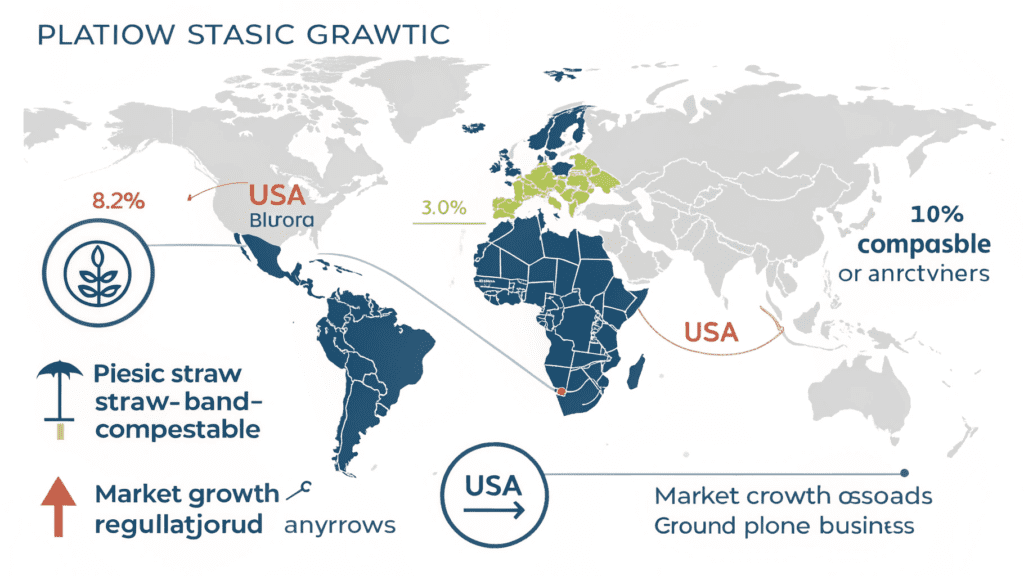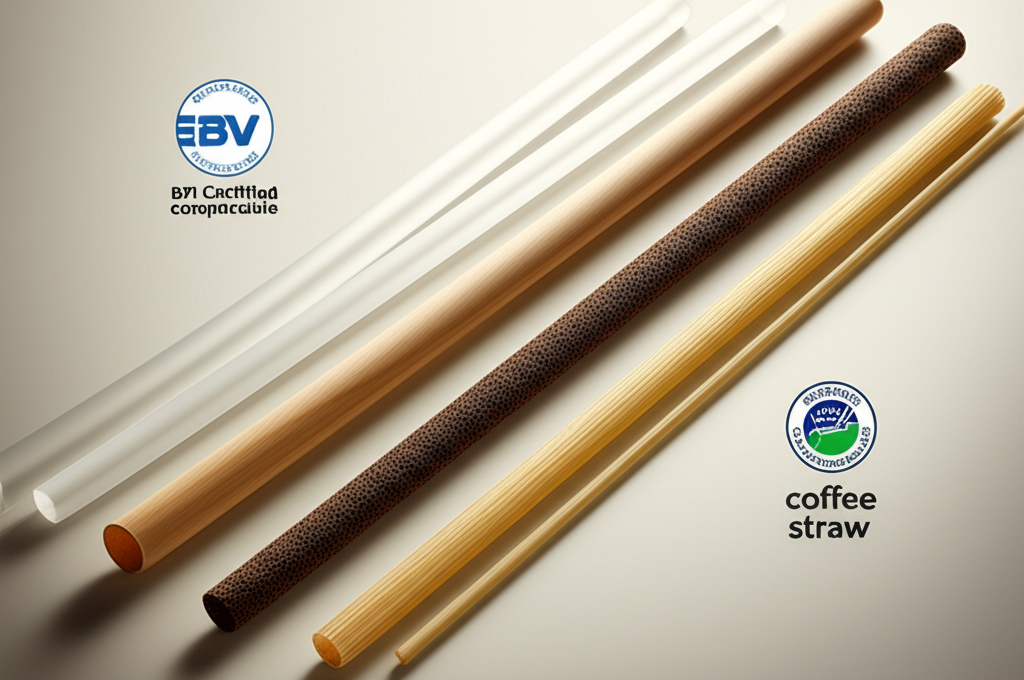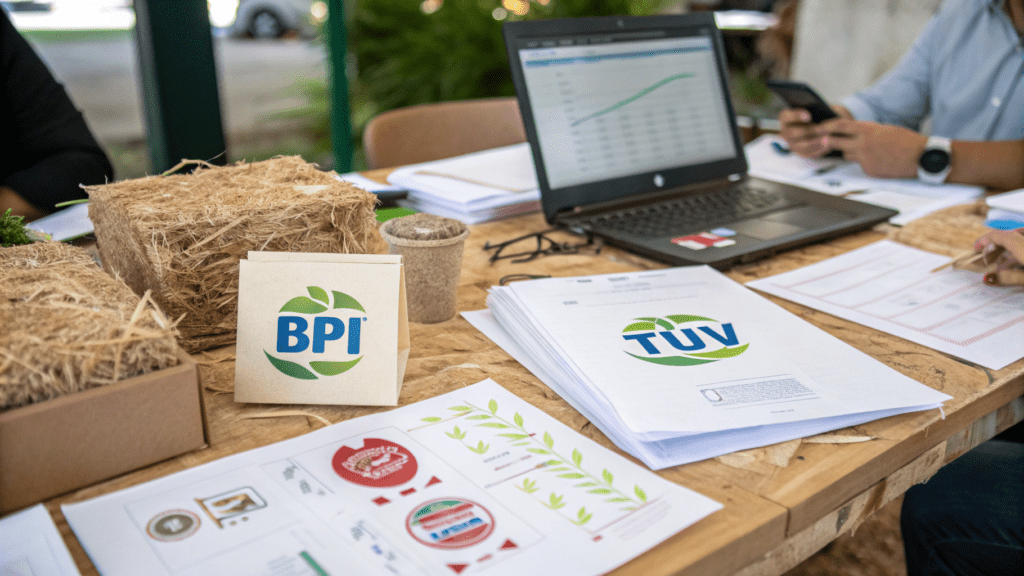The Imperative for Sustainable Sourcing: Beyond Plastic and Paper
The landscape for foodservice, hospitality, and retail businesses is undergoing a profound transformation. Escalating global pressure, driven by stringent regulations like the European Union’s Single-Use Plastics Directive and a growing wave of U.S. state bans, mandates a decisive shift away from single-use plastics. Simultaneously, consumer demand for genuinely eco-friendly practices has surged, creating an unavoidable imperative for change. This isn’t merely a compliance issue; it’s a strategic opportunity. The eco-friendly straws market alone is projected to reach approximately USD 25.1 billion by 2035, underscoring a significant growth trajectory that B2B buyers cannot afford to overlook. Adopting superior sustainable solutions is now crucial for maintaining brand integrity, meeting corporate social responsibility (CSR) objectives, and future-proofing your business in an increasingly conscious marketplace.

While many businesses have pivoted to paper straws, the reality is that these often fall short of expectations, creating new challenges rather than solving old ones. The common complaints are well-known: sogginess that ruins the drinking experience, a tendency to alter taste, and structural weakness leading to breakage and frustration. These operational and customer experience challenges directly impact brand perception and customer satisfaction. Meanwhile, the lingering legacy of conventional plastic straws, taking hundreds of years to decompose and contributing to widespread pollution, underscores the urgent need for genuinely degradable alternatives. Moving to non-paper biodegradable options is a critical step beyond temporary fixes, representing an investment in solutions that align with long-term sustainability goals and provide a superior end-user experience.
Navigating the diverse landscape of non-paper biodegradable straws requires a clear understanding of what “true” degradation means. Terms like “biodegradable” and “compostable” are often conflated, leading to what some refer to as “greenwashing.” Many bioplastics, such as Polylactic Acid (PLA), are indeed compostable but require specific industrial composting facilities with high temperatures and microbial-rich environments to break down effectively. If PLA straws end up in standard landfills, which lack these conditions, they can behave much like traditional plastics, taking hundreds or even thousands of years to decompose and potentially releasing potent greenhouse gases. The significant challenge lies in the limited availability of such industrial composting infrastructure, leading to improper disposal and undermining the intended environmental benefits of these products. Adding to this complexity, recent studies have uncovered the presence of “forever chemicals” (PFAS) in some plant-based straws, used for water resistance, raising serious concerns about environmental persistence and potential health impacts. This highlights the absolute necessity of scrutinizing product claims and certifications to avoid hidden hazards and ensure genuine environmental impact. To understand more about sustainable packaging practices, explore our resources on momoio.com/sustainability-solutions.

Fortunately, innovative advancements have led to a rich variety of advanced non-paper biodegradable straw materials now available. These include Polyhydroxyalkanoate (PHA), sugarcane, bamboo, agave, grass, coffee grounds, rice, and wheat. Each of these materials represents an evolution in straw technology, designed to overcome the historical limitations of both plastic (environmental impact) and paper (durability, taste) straws. For example, a prototype straw made from foamed cellulose diacetate (CDA), a polymer derived from wood pulp, has shown to break down significantly faster than its solid counterpart, demonstrating the pace of innovation. Each material offers unique properties in terms of durability, texture, taste neutrality, and degradation conditions, requiring careful consideration to match specific business needs.
When selecting biodegradable straws, a comparative analysis of key materials is essential for B2B buyers focused on performance, compliance, and brand value.
Key Non-Paper Biodegradable Straw Materials: A Comparative Analysis
| Material | Characteristics | Degradation Conditions | Notes |
|---|---|---|---|
| Polyhydroxyalkanoate (PHA) | Biopolymer produced by bacteria; highly durable, similar feel to plastic, excellent moisture resistance. | Degrades in various environments: soil, marine, industrial compost, home compost. | Considered a “true” biodegradable plastic; excellent for cold and hot beverages; premium option. |
| Sugarcane Bagasse | Made from the fibrous residue left after sugarcane stalks are crushed; sturdy, natural feel, heat resistant. | Industrial compostable; some variations may be home compostable. | Often a byproduct, reducing waste; good alternative to paper for durability. |
| Bamboo | Natural, fast-growing resource; reusable and durable if properly cared for; natural aesthetic. | Compostable (natural degradation); reusable for extended periods. | Best for reusability; requires cleaning; can have a distinct texture. |
| Agave | Derived from agave plant waste; strong and durable, good for various beverages. | Industrial compostable. | Utilizes agricultural waste; good structural integrity. |
| Grass | Made from natural grass fibers; unique texture, good rigidity. | Industrial compostable. | Novel material, offers a distinct eco-friendly appeal. |
| Coffee Grounds | Utilizes spent coffee grounds; unique aroma and color, sturdy. | Industrial compostable. | Innovative upcycling of waste; can have a subtle coffee scent. |
| Rice | Made from rice flour and other natural ingredients; edible, breaks down quickly. | Degrades rapidly in water and soil; edible. | Novelty and eco-friendly; may soften quickly in hot beverages. |
| Wheat | Made from wheat stalks (gluten-free); natural, sturdy, good for single-use. | Compostable (natural degradation). | Utilizes agricultural waste; natural look and feel. |

Specifically, the average US-based consumer report indicates higher reliability compared to the European data, possibly due to newer processing tech. This emphasis on robust materials reinforces not just environmental responsibility but also unparalleled user satisfaction. Imagine serving patrons a drink with a straw that holds up throughout their meal, enhancing their dining experience rather than detracting from it. This level of reliable performance significantly boosts end-user satisfaction by eliminating the common complaints associated with soggy paper straws and reinforcing positive brand perception. For insights on improving customer experience, consider our solutions at momoio.com/customer-experience.
Furthermore, these advanced non-paper options offer greater operational resilience for your business. Their reliability across diverse beverage types and temperatures means reduced breakage, less waste, and a decreased need for frequent replacements, directly contributing to operational savings. While the current global composting infrastructure still has gaps, particularly in certain regions, some materials are truly home or industrially compostable where facilities are accessible. For businesses in areas with strong composting programs, this can lead to streamlined waste diversion and reduced landfill contributions. For specific information on compostable products, you can refer to resources from the Biodegradable Products Institute (BPI) at https://bpiworld.org/.
Crucially, in a market fraught with greenwashing claims, the integrity of your sourcing is paramount. Prioritizing reputable third-party certifications like BPI Certified Compostable or TÜV OK Compost Home/Industrial is the mark of authenticity. These certifications verify biodegradability, compostability, and, critically, the absence of harmful chemicals like PFAS. Similarly, advising B2B buyers to prioritize suppliers with transparent supply chains who can provide clear documentation of material origins, manufacturing processes, and environmental impact assessments is vital. Adherence to certified products and transparent sourcing is a crucial strategy to avoid greenwashing allegations, ensure regulatory compliance, and ultimately safeguard your brand’s reputation in the eyes of increasingly informed consumers. For a deeper dive into supply chain transparency, see this article from the European Commission on Circular Economy Action Plan.

The transition to advanced non-paper biodegradable straws is more than just about meeting regulations; it’s about proactively shaping a sustainable business model that truly resonates with modern consumers. This strategic shift signals a genuine commitment to environmental stewardship, powerfully differentiating your brand in a competitive market and fostering deeper customer loyalty. Businesses that have implemented these sustainable practices consistently report positive customer feedback and an enhanced brand image, proving that eco-consciousness drives market response.
Empower your procurement and operations teams with the knowledge to navigate the complex market of biodegradable straws and select solutions that offer optimal performance, environmental integrity, and cost-effectiveness. For businesses looking to make informed decisions and transform their operations, consider momoio.com/product-catalog for a comprehensive overview of our offerings.
Ready to Transform Your Operations?
- Download our Comprehensive Buyer’s Guide to Non-Paper Biodegradable Straws to access detailed material breakdowns, certification requirements, and a supplier checklist.
- Alternatively, schedule a no-obligation consultation with our sustainability experts to discuss tailored solutions for your business. Learn more about market trends and data from Verified Market Research: https://www.verifiedmarketresearch.com/.






